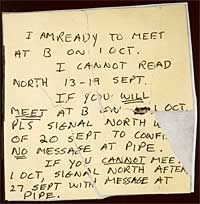Real-world espionage rarely resembles the on-screen exploits of Hollywood secret agents. Still, spying is a useful and often dangerous way for governments to gather secret information from their enemies. The successes and failures of spies have shaped foreign policy, altered the course of wars and left a deep (though usually hidden) impression on world history.
World leaders are faced with making important decisions every day, and information is the key to making the right decision. How many troops does your enemy have? How far are they in developing their secret weapons? Are they planning to negotiate a trade deal with another country? Are some of their generals planning a military coup?
Advertisement
While some of this information (known as intelligence) may be readily available, most countries keep information that could be used against them secret. Of course, this secret information is often the most valuable. To gain access to secret information, governments use espionage, a blend of subterfuge, deception, technology and data analysis. Espionage can also be used to counteract the spying efforts of the enemy, mainly be supplying them with false information.
Creating Spies
Spies are recruited in a number of ways. Some join the intelligence agencies of their home countries, receive training and move on to jobs within the agency. If their background and training fits a certain profile, they may be sent abroad to take on a cover identity (more on this in the next section).
The best field agents are those with access to high-ranking officials or secret information in other countries. Spy agencies employ recruiters, people who target citizens of other countries who are likely to turn against their homeland and become spies. These defectors are invaluable spies, since they already have a cover and can provide information almost immediately. There are several factors that can cause someone to defect and become a spy:
- Ideological disagreement with their home country. During the Cold War, the KGB (the Russian abbreviation for Committee for State Security, the Soviet Union's intelligence and secret police agency) had success recruiting agents in the United States and Britain who were known to support communism or belong to communist organizations.
- Money. Many spies have turned over crucial, deadly information for nothing more than cash.
- Desire to be "important". Recruiters look for people in menial positions who have access to important information. Certain psychological factors can drive some people to become spies because it makes them feel powerful.
- Blackmail. Recruiters who hold evidence of behavior that their target would not want made public, such as an extramarital affair, can threaten to release the evidence if the target doesn't agree to become a spy. Threats of physical harm to the target or her family members also work well.
On rare occasions, no recruiting work is needed at all. Someone who wants to provide information walks in to an embassy or consulate and offers to become a spy. These walk-ins may be viewed with distrust as potential sources of misinformation from the enemy, but they can also become valuable spies.
Once a recruiter has recruited someone willing to gather information, the new spy will be put in contact with a controller. The controller will offer some training in spying methods and issue instructions for obtaining and transmitting information. The spy will usually have contact with no one else, never learning the names of any other spies or officials. This is known as compartmentalization. Each spy works within his own compartment, so if he is captured and interrogated, he can't reveal vital information or the identities of other spies.
Advertisement




